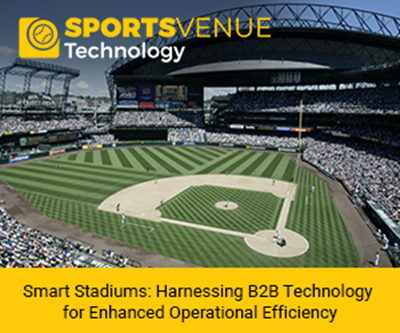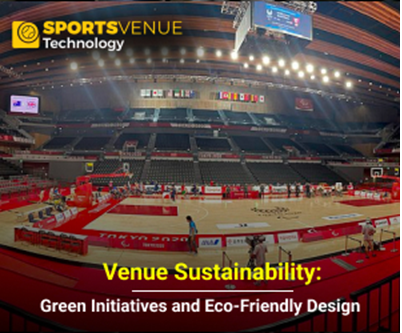Smart Stadiums: Harnessing B2B Technology for Enhanced Operational Efficiency

Introduction:
In the world of sports, operational efficiency in sports venues has never been more crucial in today's digital age. The significance of behind-the-scenes orchestration cannot be overlooked as it directly impacts the fan experience. This article explores the realm of smart stadiums and how B2B technology is driving a transformation in sports venue management.
Section 1: The Evolution of Stadium Operations
Traditional Challenges in Stadium Operations:
Sports venue operators have long faced challenges in operational efficiency, including crowd management, ticketing, concession services, facility maintenance, and fan engagement. These challenges hindered the fan experience.
Changing Expectations in the Digital Age:
In the digital age, fans and stakeholders have evolved in their expectations. They demand seamless connectivity, personalized experiences, data-driven insights, and enhanced security.
The Need for Innovative Solutions:
Smart stadiums have emerged as a strategy to address evolving expectations and challenges in stadium operations. They utilize B2B technology to enhance efficiency, streamline operations, and boost revenue.
Section 2: B2B Technology in Stadium Operations:
B2B technology optimizes various aspects of stadium operations through data analytics, IoT, and automation. These technologies empower data-driven decision-making, enhance security, and improve fan experiences.
Examples of Successful Implementations:
Mercedes-Benz Stadium, Allianz Arena, and Emirates Stadium demonstrate how B2B technology improves operational efficiency and fan experiences in real-world scenarios.
Section 3: Benefits of Enhanced Operational Efficiency:
Efficient stadium operations result in cost savings, revenue generation, improved fan experiences, and enhanced safety measures. This section explores the advantages of B2B technology in stadium operations.
Advantages of B2B Technology in Stadium Operations
The incorporation of B2B technology into stadium operations yields numerous advantages:
1. Cost Savings:
- Resource Efficiency: B2B tech optimizes resource allocation, reducing labor costs and waste.
- Energy Savings: Automation cuts energy consumption and utility expenses.
- Maintenance: Predictive maintenance extends asset lifespan and lowers repair costs.
2. Revenue Generation:
- Targeted Marketing: Data-driven insights enhance marketing, boosting sales and concession revenue.
- Premium Experiences: Personalization allows for premium offerings, increasing revenue.
- Sponsorship Opportunities: Improved engagement leads to more attractive sponsorship deals.
3. Enhanced Fan Experience:
- Convenience: Mobile apps and contactless solutions streamline fan interactions.
- Personalization: Customized promotions and experiences enhance fan satisfaction.
- Connectivity: Robust networks enable real-time engagement and social media interaction.
4. Safety Measures:
- Access Control: Advanced ticketing and access solutions improve crowd management and security.
- Security Monitoring: AI-powered systems swiftly identify threats, enabling proactive responses.
- Emergency Response: Efficient communication systems ensure rapid responses to emergencies.
Case Studies of Stadiums Benefiting from B2B Technology: AT&T Stadium, Optus Stadium, and Hard Rock Stadium provide concrete examples of cost savings, revenue generation, and fan experience improvements achieved through enhanced operational efficiency.
Section 4: Key Technologies and Solutions:
Smart stadiums leverage various B2B technologies and solutions in ticketing and access control, security, facility management, and fan engagement. This section details these technologies and their impact.
1. Ticketing and Access Control:
- Mobile Ticketing: Mobile apps and digital platforms streamline ticketing, reducing paper waste and entry hassles.
- Biometric Authentication: Fingerprint or facial recognition enhances security and expedites entry.
- Contactless Payments: NFC technology enables faster and more convenient concession transactions.
2. Security:
- Surveillance Cameras: High-resolution cameras with AI capabilities provide real-time monitoring and threat detection.
- Access Control Systems: Smart cards or mobile apps manage entry points securely.
- Cybersecurity: Robust measures protect against data breaches and cyber threats.
3. Facility Management:
- IoT Sensors: Sensors monitor environmental factors like temperature and lighting, optimizing energy use and maintenance.
- Asset Tracking: RFID and GPS technology track assets' locations and statuses, from equipment to vehicles.
- Predictive Maintenance: Machine learning analyzes sensor data to predict equipment and facility maintenance needs proactively.
4. Fan Engagement:
- Mobile Apps: Customized apps offer fans features like ticketing, concession ordering, instant replays, and interactive maps.
- Augmented Reality (AR): AR enhances the fan experience with virtual tours, games, and displays.
- Data Analytics: Real-time data analytics and CRM systems enable personalized fan engagement, targeted promotions, and improved customer service.
Section 5: Challenges and Considerations:
While B2B technology offers numerous advantages, it also presents challenges related to data privacy, cybersecurity, implementation costs, resistance to change, technical integration, fan education, and scalability. This section outlines these challenges and offers strategies to address them.
1. Data Privacy Concerns:
- Challenge: Collecting and using fan data raises data privacy concerns.
- Strategy: Prioritize transparency, obtain explicit consent for data collection, implement robust data encryption, and comply with data protection regulations like GDPR or CCPA.
2. Cybersecurity Risks:
- Challenge: Smart stadiums are susceptible to cybersecurity threats.
- Strategy: Invest in robust cybersecurity measures, including firewalls and intrusion detection systems. Conduct employee training and collaborate with cybersecurity experts to stay ahead of emerging threats.
3. Implementation Costs:
- Challenge: Adopting B2B technology can be expensive.
- Strategy: Consider phased implementations, explore financing options or partnerships, and conduct cost-benefit analyses to demonstrate long-term value.
4. Resistance to Change:
- Challenge: Employees and stakeholders may resist technological changes.
- Strategy: Implement change management programs to educate and involve staff. Showcase technology's benefits in improving working conditions and career opportunities.
5. Technical Integration Complexity:
- Challenge: Integrating various B2B technologies can be complex.
- Strategy: Prioritize open and interoperable systems, engage experienced system integrators, and regularly update and maintain systems.
6. Fan Education and Acceptance:
- Challenge: Fans may resist new technologies.
- Strategy: Communicate benefits clearly, offer support and tutorials, and gather and respond to fan feedback to improve technology adoption.
7. Scalability and Future-Proofing:
- Challenge: Technology can quickly become obsolete.
- Strategy: Invest in flexible, scalable solutions and stay informed about emerging technologies to ensure long-term relevance.
Section 6: The Future of Smart Stadiums
Smart stadiums are evolving with upcoming trends like 5G connectivity, AI-powered fan engagement, immersive experiences, sustainability initiatives, and an expanded concept beyond sports events. This section discusses these trends and the role of 5G, AI, and sustainability in shaping the future of smart stadiums.
Shaping the Future of Smart Stadiums: Trends and Technological Advancements
Smart stadiums are on a dynamic trajectory, driven by continuous technological advancements that promise to redefine the landscape of sports and entertainment venues. In this section, we explore upcoming trends and innovations and the pivotal roles of 5G, AI, and sustainability in shaping the future of smart stadiums:
Upcoming Trends and Innovations:
1. 5G Connectivity: The widespread deployment of 5G networks is set to revolutionize the fan experience. It will enable real-time, high-definition streaming, augmented reality (AR), and virtual reality (VR) experiences within stadiums. Fans will have access to instant replays, stats, and interactive elements like never before.
2. AI-Powered Fan Engagement: Artificial intelligence will play a more prominent role in enhancing fan engagement. AI-driven chatbots, personalized content recommendations, and predictive analytics will create tailored experiences, driving fan satisfaction.
3. Immersive Experiences: AR and VR technologies will become integral to the stadium experience. Fans will be able to virtually attend events, interact with holographic displays, and access immersive, location-based AR games and experiences.
4. Sustainability Initiatives: Smart stadiums will increasingly adopt eco-friendly practices, such as renewable energy sources, energy-efficient technologies, and waste reduction measures. Sustainability certifications like LEED (Leadership in Energy and Environmental Design) will become more common.
Role of 5G, AI, and Sustainability:
5G: The rollout of 5G networks will be a game-changer for smart stadiums. It will enable high-capacity, low-latency connectivity, making real-time fan engagement and immersive experiences a reality. Additionally, 5G will support the rapid transfer of large volumes of data for analytics and security purposes.
AI: Artificial intelligence will continue to improve operational efficiency in smart stadiums. AI-driven predictive maintenance will reduce downtime, and AI-powered security systems will enhance safety. Furthermore, AI-driven fan engagement will provide personalized experiences and boost revenue.
Sustainability: The sports industry now places greater emphasis on sustainability. Smart stadiums are embracing energy-efficient technologies, incorporating renewable energy sources such as solar panels and wind turbines, and implementing water conservation measures. These initiatives not only contribute to environmental well-being but also result in reduced operational expenses.
The Evolving Concept of Smart Stadiums:
The concept of smart stadiums will evolve beyond technology-driven efficiency and fan engagement:
1. Community Hubs: Smart stadiums will become year-round community hubs, hosting a wide range of events beyond sports, including concerts, conferences, and cultural gatherings. They will serve as multi-purpose, technologically advanced venues.
2. Health and Wellness: Stadiums will incorporate health and wellness features, such as gyms, wellness centers, and medical facilities. They will prioritize fan well-being and provide holistic experiences.
3. Global Connectivity: Smart stadiums will strengthen global connectivity, enabling fans worldwide to connect with events and experiences in real time. This will expand the reach of sports and entertainment.
4. Hybrid and Virtual Events: In addition to physical events, stadiums will host hybrid and virtual experiences that combine in-person attendance with online participation, catering to diverse fan preferences.
5. Data-Driven Decision-Making: Data analytics will continue to be a driving force, helping stadiums make informed decisions on everything from resource allocation to fan engagement strategies.
Conclusion:
B2B technology is revolutionizing stadium operations, leading to smarter, more efficient venues. The future holds promises of 5G connectivity, AI-driven engagement, sustainability, and global connectivity, making smart stadiums dynamic hubs of innovation. This transformation benefits fans, stakeholders, and the sports industry as a whole, marking a visionary leap toward a more immersive, inclusive, and sustainable future.
| Read More: Smart Stadiums: Connectivity and IoT Solutions for Fan Engagement |





